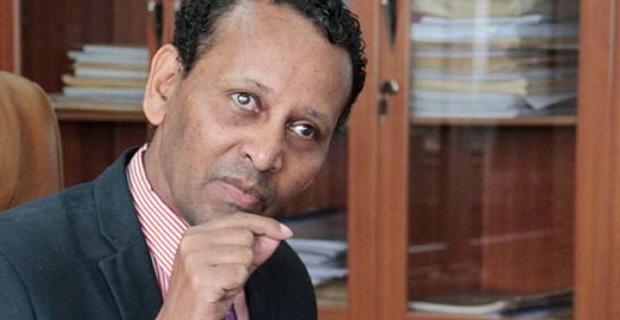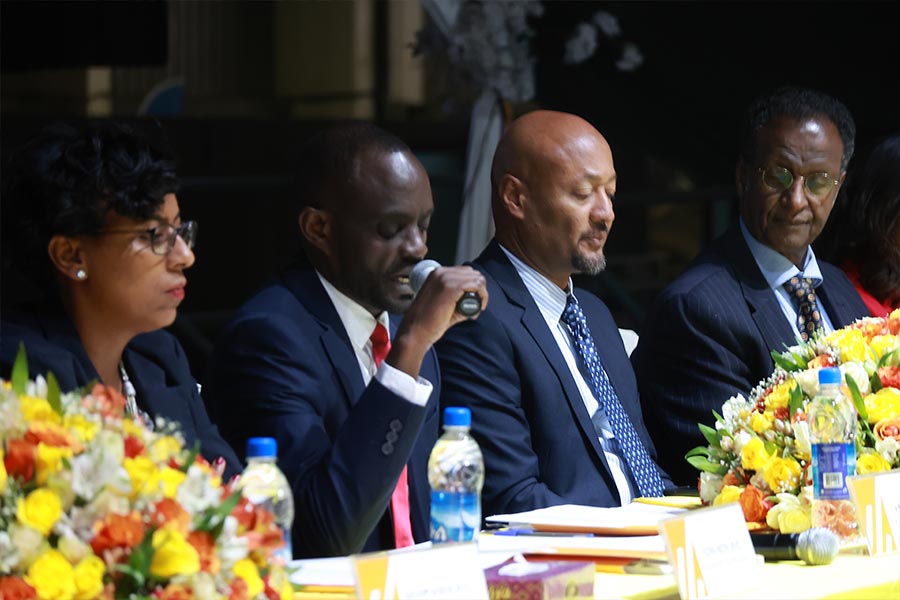
Radar | Jul 21,2024
Mar 23 , 2019
 The Office of the Auditor General found nearly 290 million Br in financial gaps in the budget year.
The Office of the Auditor General found nearly 290 million Br in financial gaps in the budget year. The Auditor General warbed officials of the Ministry of Foreign Affairs for their defence of audit gaps in the 2016/17 fiscal year.
The Office of the Auditor General found nearly 290 million Br in financial gaps in the budget year. The 76-page audit report, sent to the Ministry on August 2018, lists illegitimate procurements and unproven payments, unaccounted expenses and accounts, inappropriate budget utilisation and bloated benefits.
The standing committee of parliament, Public Expenditure Administration & Regulation, held a session on March 20, 2019 attended by Gemechu Dubisso, Auditor General; representatives from the Ministry of Finance and Federal Ethics & Anti-Corruption Commission; and officials from the Ministry of Foreign Affairs led by State Minister Birtukan Ayano, who appeared before the Standing Committee for questioning.
The Ministry Foreign Affairs manages the financial accounts of 46 embassies and 14 consular offices stationed around the world in addition to the main office in Addis Abeba. Foreign Affairs also oversaw the accounts of support staff assigned from other institutions working in different embassies and consular offices. The Foreign Ministry claims that expenditures spent to cover costs of personnel who arrive at different embassies from different federal agencies are not refunded on time, thus reflecting an audit gap.
The line of reasoning given by officials of the Ministry were not satisfactory to Gemechu Dubisso, the Auditor General, who argued that the Ministry had enough accountants to have sorted the accounts.
The audit findings showed unsubstantiated payments made for various anniversaries, trainings, event organisers, foreign travels and service acquisitions. The audit listed unauthorized procurements that did not follow proper procedures as provided by law, such as expenses for hotel accommodations and meals. The Auditor General also asked about unsettled receivables amounting to 46 million Br that has been in the books since the 2015/16 budget year.
“The reshuffling of accountants every two years at embassies has to be phased out for it allows financial improprieties to continue without corrections year after year,” said Gemechu.
Nebiyat Getachew, the Foreign Ministry's spokesperson, recognised that the problem of receivables is a result of travel by different delegations to various embassies that incur costs on the Foreign Ministry's budget followed by a delay in refunds made to the Ministry by the institutions.
"The problem is that the organisations don't reimburse the money in a timely manner," Nebiyat said.
Gemechu acknowledged efforts expended by officials in addressing audit gaps.
These include helping devise new directives by the Finance Ministry that necessitates exceptional transactions to be approved, the establishment of two departments that would follow and solve problems related to receivables and payables and training given to all accountants of the Ministry.
For Abebe Wale, Accounting & Finance Department lecturer at Bahir Dar University for more than 16 years, the audit findings in most of the governmental institutions are similar every year, because no follow ups are taken by parliament despite allegations made by the Auditor General.
"It also should be necessary to consider devising flexible directives and laws that suit the spending patterns of organisations," he said.
Two years ago with the main aim of preventing audit irregularities, the Ministry of Finance issued a directive that penalises and fines government officials and employees who spend money without the proper procurement procedures. Even though it did not become operational, the directive also included a provision that levies fines on ministers whose institutions fail to submit audit reports on time.
PUBLISHED ON
Mar 23,2019 [ VOL
19 , NO
986]

Radar | Jul 21,2024

Radar | Oct 10,2020

Fortune News | Dec 23,2023

Radar | Feb 19,2022

Viewpoints | Mar 13,2021

Radar | Dec 02,2023

Radar | Jun 26,2021

Radar | Dec 05,2020

Radar | Nov 13,2021

Commentaries | Jun 24,2023

Dec 22 , 2024 . By TIZITA SHEWAFERAW
Charged with transforming colossal state-owned enterprises into modern and competitiv...

Aug 18 , 2024 . By AKSAH ITALO
Although predictable Yonas Zerihun's job in the ride-hailing service is not immune to...

Jul 28 , 2024 . By TIZITA SHEWAFERAW
Unhabitual, perhaps too many, Samuel Gebreyohannes, 38, used to occasionally enjoy a couple of beers at breakfast. However, he recently swit...

Jul 13 , 2024 . By AKSAH ITALO
Investors who rely on tractors, trucks, and field vehicles for commuting, transporting commodities, and f...

Nov 1 , 2025
The National Bank of Ethiopia (NBE) issued a statement two weeks ago that appeared to...

Oct 25 , 2025
The regulatory machinery is on overdrive. In only two years, no fewer than 35 new pro...

Oct 18 , 2025
The political establishment, notably the ruling party and its top brass, has become p...

Oct 11 , 2025
Ladislas Farago, a roving Associated Press (AP) correspondent, arrived in Ethiopia in...